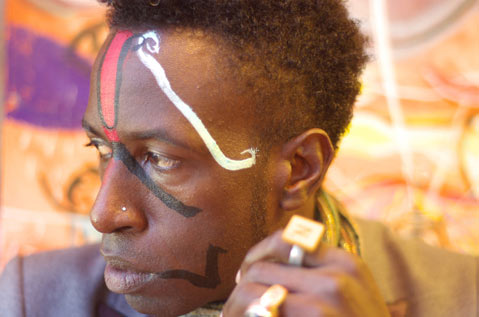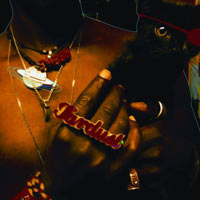Saul Williams Brings Afro-Punk Tour to Velvet Jones
Rapper, Rocker, Performance Artist, and Poet Storms S.B. This Week

Even for seasoned music fans, the intensity of Saul Williams can come as a shock. “One of my favorite quotes comes from Maya Angelou, where she says that anything a writer writes should be written with the urgency of what they would write if someone were holding a gun in their mouth,” said the poet, actor, and alt-rock/hip-hop star, who’s headlining the Afro-Punk Tour, which hits Velvet Jones on Wednesday, November 11. This is the philosophy he adopts as a writer and performer. On the song “DNA,” he raps: “Hail Mary, mother of God. Got the whole host of angels shuffling in my iPod. Niggas learned to raise their voices when I lowered my rod. Staff of Moses, Pharaoh knows this. Son, my word is my bond.” Needless to say, “urgency” may be an understatement when describing Williams’s lyrics.
With everything from the identity politics of his words to the theatrics of his live show, Williams confronts his audience to the point at which many become uncomfortable. Literally in-your-face, his “List of Demands (Reparations)” video consists of more than three minutes of virtually uninterrupted close-ups on Williams’s countenance-his teeth glowing like LED bulbs as he appeals for social justice: “I want my money back. I’m down here drowning in your fat. You got me on my knees praying for everything you lack.”
For concerts, Williams dons feathers and face paint that transform him into the title character from his latest album, The Inevitable Rise and Liberation of Niggy Tardust. “I think that performance should be all-encompassing,” he explained recently over the phone. “I think of performance as ritual. : Look at what warriors did before they went out to fight. Look what they did to their faces to evoke a sense of fear in the people they were fighting, but also to bring them out of themselves and to evoke a certain energy. : My background’s in theater, and I felt that, in creating this character, Niggy Tardust, there is a way that he looks, which is quite different and a little more elevated than how I look on regular days when you see me walking down the street. And the challenge became, how do I bring that to life? I’m adding stuff to my face and to my appearance to the point where I look in the mirror and I don’t see Saul Williams anymore. And it frees me.”

Due largely to the engineering of Nine Inch Nails frontman Trent Reznor, The Inevitable Rise presents a dystopian clash of industrial noise, rock, reggae, and rap that is far removed from the relatively straightforward hip-hop of Williams’s debut. The sound and the decision to work with Reznor reflect the artist’s attitude. “We both were as tired of the shit we were hearing on the radio, for example. We both were as hungry to create something that defied the idea of genre; that really spoke to how we hear music and how we see things,” Williams said.
The demise of hip-hop has been predicted many times, notably by Nas’s 2006 album, Hip-Hop Is Dead. Williams’s self-titled record dealt with that concern with songs such as “Telegram,” which declared: “This ain’t hip-hop no more, son, it’s bigger than that. : This system ain’t for us. It’s for rich people. And you ain’t rich, dawg, you just got money.” But if hip-hop ever experiences its oft-foretold Armageddon, Williams may be one of the artists most likely to survive.
When asked about the future of hip-hop, Williams said, “We have to realize that death is a part of life, and that another name for it can sometimes be something like transformation. I do think that hip-hop is transforming. I think more of us are capable of making beats and picking up instruments. At the time when hip-hop was created, school systems in New York were not putting instruments in the hands of children and what-have-you. So we were making our own instruments, making music with our turntables, and using what we had. But now, a lot of us have a bit more, and so the sound that we’re interested in and the sound that we’re able to create is just, you know, a lot more. And we’re in the process of redefining who we are.”
Williams and other artists on the Afro-Punk Tour challenge the barriers between black musicians and alternative rock, which ostensibly is the domain of whites, despite the importance of early black groups like Bad Brains and Fishbone. “For me, growing up in New York in the ’80s, I listened to hip-hop, and I loved it. And I started listening to alternative music as well and sort of felt like I had to hide that,” Williams recalled. “And I didn’t know many people who were into it in the same way. And so, Afro-Punk just kind of brings those people together. : The idea is to say, ‘Dude, you can be into anything. It’s alright.'” With the rise of such incendiary yet post-racial music in mind, the question becomes not when hip-hop will expire, but rather-to paraphrase Yeats-what slouches toward Bethlehem to be born.
4•1•1
Club Mercy presents Saul Williams at Velvet Jones (423 State St.) on Wednesday, November 11, at 9 p.m. Call 962-7776 or visit clubmercy.com for ticket info.



